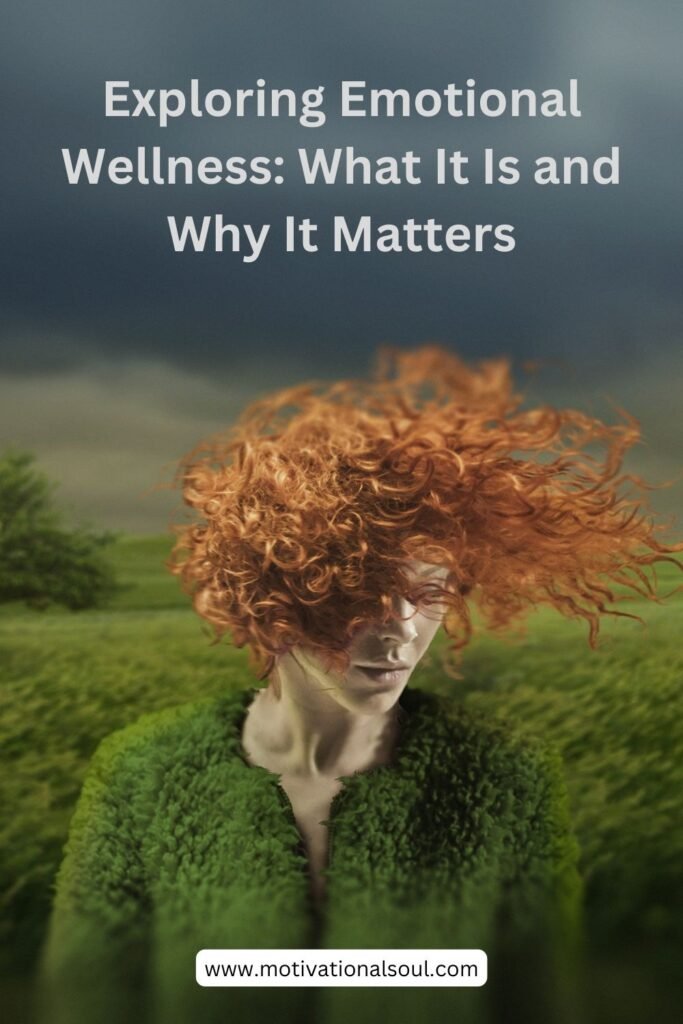Exploring Emotional Wellness: What It Is and Why It Matters

When you think about “wellness,” what images drift through your mind? Do you see a robust body brimming with vitality? A crystal-clear intellect spinning with creativity? Or a calm existence enriched by restful moments and shared laughter? All of these layers of wellness certainly matter. But there’s one domain that often stays tucked away in the background: emotional wellness. In this piece, we’ll explore what emotional wellness truly involves, why it’s so indispensable, and how you can intentionally nurture it in your own life.
Quote #1: “Your present circumstances don’t determine where you can go; they merely determine where you start.” — Nido Qubein
WHAT IS EMOTIONAL WELLNESS?
Emotional wellness is the art of identifying, guiding, and engaging with your feelings in a manner that sustains a balanced and hopeful outlook. It means trusting in your own inner strength, believing you can endure life’s sudden tempests without letting them unravel you. When you’re emotionally well, you approach life’s surprises with poise and compassion—both for yourself and others—relying on supportive people when you need extra help, and discovering authentic happiness in small, everyday moments.
WHY DOES EMOTIONAL WELLNESS MATTER?
Emotional wellness holds just as much significance as your physical fitness or intellectual acuity. If your emotional world is out of harmony, it can sabotage nearly every other dimension of your life. You might feel swamped by tasks at work, struggle to concentrate on school assignments, or retreat from social engagements. Moreover, unchecked anxiety and stress can provoke physical problems—such as headaches, stomach issues, or restless nights. Placing emotional wellness front and center safeguards your entire being, paving the way toward a healthier, more rewarding life.
Quote #2: “The greatest wealth is health.” — Virgil
THE HISTORY OF EMOTIONAL WELLNESS
Although it can seem like a modern buzzword, the idea of governing one’s emotions stretches back centuries. Aristotle, for instance, championed the importance of refining our emotions to lead a virtuous life. In the early 1800s, Johann Friedrich Herbart also emphasized emotional self-command. The phrase “emotional wellness” itself, however, wasn’t commonly used until the mid-20th century. Influential figures like American psychiatrist Harry Stack Sullivan connected emotional well-being to broader mental health, while psychologist Abraham Maslow included emotional needs within his famous hierarchy. Recent research continues to underscore how nurturing our emotional lives boosts immunity, supports cardiovascular health, and may even prolong our longevity.
HOW EMOTIONAL WELLNESS AFFECTS YOUR LIFE
When your emotional balance wavers, the impact can echo through your relationships, sense of purpose, and daily routines. Stress and unwanted emotions might distance you from the people you care about, interfere with your ability to excel in your work, or rob you of satisfaction in everyday life.
- Relationships
Our emotional landscape shapes how we connect with others. If you feel calm and content, you’re more likely to open up and be genuine with friends and family. When heavy emotions like sadness or frustration take root, you might instinctively pull away or erect barriers. Meanwhile, solid emotional wellness promotes a gentler, more patient bond with yourself, which in turn enriches how you interact with loved ones. - Work and School
Emotional wellness energizes productivity and mental clarity. A composed mind has an easier time focusing—whether you’re tackling a complex work project or preparing for a key exam. Low stress levels free you from mental haze, enabling you to make sound decisions and give your best effort. - Mental Health
While not identical to mental health, emotional wellness is a crucial ingredient. Emotional wellness zeroes in on how we process and express our feelings, whereas mental health encompasses a broader spectrum. Strengthening emotional wellness can bolster your overall mindset and equip you to handle life’s rollercoaster of highs and lows.
BENEFITS OF STRONG EMOTIONAL WELLNESS
• Boosts your immune response
• Encourages a healthier cardiovascular system
• Potentially extends your lifespan
• Helps curb stress
• Heightens your ability to concentrate
• Promotes wiser decision-making
• Enriches self-esteem and interpersonal relationships
Quote #3: “It is not the load that breaks you down, it’s the way you carry it.” — Lou Holtz
THE IMPACT OF POOR EMOTIONAL WELLNESS
Overlooking your emotional environment can yield severe consequences. Lingering stress and unaddressed emotional struggles can escalate into anxiety or depression, sap your energy levels, and even harm your physical well-being. It can also create rifts in your relationships and hinder your accomplishments in your job or coursework. Spotting the signs of emotional overwhelm is the first step toward releasing yourself from its grip.
HOW TO OPTIMIZE YOUR EMOTIONAL WELLNESS
Cultivating emotional wellness involves both self-reflection and deliberate effort. Fortunately, there are many practical ways to strengthen this dimension of your life.
- Practice Mindfulness
Mindfulness means immersing yourself in the present—observing thoughts, feelings, and physical sensations without assigning judgment. Techniques such as meditation, measured breathing, or a simple walk outdoors can anchor you in the now, granting a clearer perspective on your emotions.
Quote #4: “In the midst of movement and chaos, keep stillness inside of you.” — Deepak Chopra
- Connect and Communicate With Others
Spending genuine time with people who uplift you can do wonders. Whether it’s an honest conversation with a family member or a spontaneous coffee break with a friend, open dialogue strengthens bonds and helps you move through emotional hurdles more smoothly. - Manage Stress
Stress, when allowed to wander unchecked, can gradually seep into every corner of your life. Identify your primary stress triggers and tackle them head-on by employing time management, journaling, or clear boundary-setting. Don’t forget to incorporate leisure—like painting, yoga, or reading—to reset your mental state. - Take Care of Your Physical Wellbeing
Our emotional resilience is closely woven to our physical condition. Fueling your body with nutrient-rich food, staying active, and sleeping well provide a sturdy framework for emotional stability. Even small acts of physical self-care—like a relaxing bath or sipping herbal tea—can significantly restore a sense of calm. - Work Towards a Balanced Life
Strive to divide your time in a way that allows for meaningful work, play, and rest. Balance doesn’t look the same for everyone, but by allocating moments for personal hobbies, connection with others, and introspection, you craft a rhythm that keeps you grounded and fulfilled. - Sleep
Nothing fuels emotional health more powerfully than quality rest. Poor sleep can leave you feeling prickly, scatterbrained, and more prone to stress-related ailments. Aim for enough uninterrupted rest to rise each morning genuinely restored.
Quote #5: “Happiness is not something readymade; it comes from your own actions.” — Dalai Lama
Ultimately, emotional wellness nurtures your ability to ride out life’s natural ebb and flow with perseverance and self-kindness. By regularly tending to your emotional wellbeing—through mindfulness, supportive social circles, stress management, physical care, and creating a healthy work-life balance—you pave the way for a life richer in vitality, love, and meaning. A sound mind and a content heart feed each other, and investing in one will inevitably strengthen the other.




Recent Comments